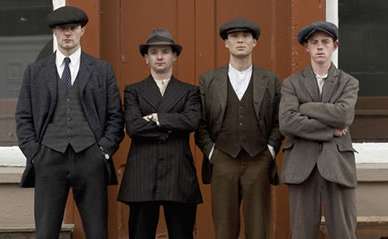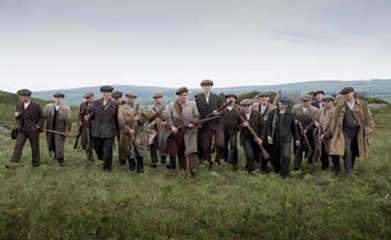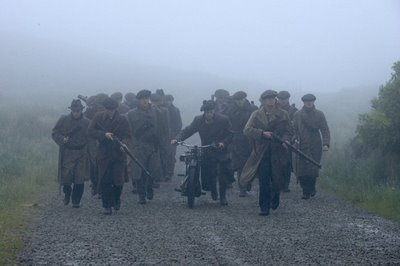The Wind That Shakes the Barley
by Nick
Whether or not you agree with Ken Loach's political views, he has been one of the best and - amazingly, considering that he's always been so openly political - most solid working directors for the last fifteen years. Hidden Agenda, Raining Stones, Land and Freedom, My Name Is Joe, Sweet Sixteen, and Ae Fond Kiss are - if you haven't seen them - all recommended viewing.
The reason why Loach is a better filmmaker than those of his British contemporaries that've gone to Hollywood, is seen as well as explained in The Wind That Shakes Barley (winner of the Palme D'Or this year). This is the film Michael Collins tried to be, but never could have. It clarifies the Irish conflict better than any other film I've seen so far, simply by taking it from the perspective of the Irish peasants, those who would come to form the Irish Republican Army, the IRA. Their reasoning is here made horribly clear.
 Cillian Murphy, playing the main role, is great as Damien. This is a guy who starts out as a quiet newly-examined doctor, intent on going to London and blacking out the conflict, but ends up as one of the founding fathers of the IRA. I hate to use the cliché of 'quiet intensity,' but the guy really exudes it here. You'll see what I mean by the end.
Cillian Murphy, playing the main role, is great as Damien. This is a guy who starts out as a quiet newly-examined doctor, intent on going to London and blacking out the conflict, but ends up as one of the founding fathers of the IRA. I hate to use the cliché of 'quiet intensity,' but the guy really exudes it here. You'll see what I mean by the end.
It is also a film of striking visuals. It's all natural lighting (I think) and the rolling, green vistas of Ireland and its low-roofed clay houses are as much a character here as the desert and sand in Lawrence of Arabia.
 Those unwilling towards the film for being 'propaganda,' as IRA-justification, or demonising of the British etc., do the film and themselves a disfavor. It shows the arguments and justifications of both sides. As for the comparisons with the current occupation of Iraq, well that's history for you. What I can say is that the film works just as well without the parallels.
Those unwilling towards the film for being 'propaganda,' as IRA-justification, or demonising of the British etc., do the film and themselves a disfavor. It shows the arguments and justifications of both sides. As for the comparisons with the current occupation of Iraq, well that's history for you. What I can say is that the film works just as well without the parallels.
Since this won the Palme D'Or you'd perhaps expect it to be something extraordinary, above the 'ordinary' Loach. And well, it's not. Not that this is a bad thing. What this is is a very, very good Ken Loach-film, one his best so far.
Perhaps Loach's great track record has to do with that unlike most political filmmakers the feeling I always get off his films is that he is craftsman more than artist. That, though they feel organic, nothing has been left to chance. And this film feels crafted to near perfection, despite, or maybe it's because, though the characters actions are unpredictable, they are understandable, and even if the end feels unavoidable, it is surprising and unnerving. Like all good stories it ends where it begun.
This is a film that is hard to grasp and give a fair impression of. I can't quite pinpoint it, but I think it has something to do with it being a great story, but with an uneven and forced plot, if that makes any sense. Even if it has horrible scenes of murder and torture, in a way it feels cold. There are some standout scenes, but none of them warm your heart exactly, and some great performances, even if the characters themselves are somewhat bland. None the less, I left the theatre heartbroken.
The reason why Loach is a better filmmaker than those of his British contemporaries that've gone to Hollywood, is seen as well as explained in The Wind That Shakes Barley (winner of the Palme D'Or this year). This is the film Michael Collins tried to be, but never could have. It clarifies the Irish conflict better than any other film I've seen so far, simply by taking it from the perspective of the Irish peasants, those who would come to form the Irish Republican Army, the IRA. Their reasoning is here made horribly clear.
 Cillian Murphy, playing the main role, is great as Damien. This is a guy who starts out as a quiet newly-examined doctor, intent on going to London and blacking out the conflict, but ends up as one of the founding fathers of the IRA. I hate to use the cliché of 'quiet intensity,' but the guy really exudes it here. You'll see what I mean by the end.
Cillian Murphy, playing the main role, is great as Damien. This is a guy who starts out as a quiet newly-examined doctor, intent on going to London and blacking out the conflict, but ends up as one of the founding fathers of the IRA. I hate to use the cliché of 'quiet intensity,' but the guy really exudes it here. You'll see what I mean by the end.It is also a film of striking visuals. It's all natural lighting (I think) and the rolling, green vistas of Ireland and its low-roofed clay houses are as much a character here as the desert and sand in Lawrence of Arabia.
 Those unwilling towards the film for being 'propaganda,' as IRA-justification, or demonising of the British etc., do the film and themselves a disfavor. It shows the arguments and justifications of both sides. As for the comparisons with the current occupation of Iraq, well that's history for you. What I can say is that the film works just as well without the parallels.
Those unwilling towards the film for being 'propaganda,' as IRA-justification, or demonising of the British etc., do the film and themselves a disfavor. It shows the arguments and justifications of both sides. As for the comparisons with the current occupation of Iraq, well that's history for you. What I can say is that the film works just as well without the parallels.Since this won the Palme D'Or you'd perhaps expect it to be something extraordinary, above the 'ordinary' Loach. And well, it's not. Not that this is a bad thing. What this is is a very, very good Ken Loach-film, one his best so far.
Perhaps Loach's great track record has to do with that unlike most political filmmakers the feeling I always get off his films is that he is craftsman more than artist. That, though they feel organic, nothing has been left to chance. And this film feels crafted to near perfection, despite, or maybe it's because, though the characters actions are unpredictable, they are understandable, and even if the end feels unavoidable, it is surprising and unnerving. Like all good stories it ends where it begun.
This is a film that is hard to grasp and give a fair impression of. I can't quite pinpoint it, but I think it has something to do with it being a great story, but with an uneven and forced plot, if that makes any sense. Even if it has horrible scenes of murder and torture, in a way it feels cold. There are some standout scenes, but none of them warm your heart exactly, and some great performances, even if the characters themselves are somewhat bland. None the less, I left the theatre heartbroken.


3 Comments:
Would love to see it. Far as I know, it hasn't been picked up for US distribution yet, though.
Can't imagine it not getting any. It's definitely good enough to warrant it, albeit limited. Only needs to be sold right. Whatever controversy it's likely to generate can only add to the box-office. The kind of people who see Loach's films aren't likely to be put off by it (vice versa, too, I suppose), and this is his most commercially viable film since Land and Freedom.
Somewhat O.T. but one thing that's struck me lately is that Cillian Murphy has got to be one of the strangest leading men to come along since, shit, Johnny Depp? Gary Oldman? Guy Pearce? One wouldn't have thought it first seeing him in 28 Days Later, but Batman Begins, Red Eye and now this has made me really perk up to the guy. A perverted looking pretty boy, with soul? That's worth something.
Breakfast on Pluto was pretty good too.
I expect Wind to get picked up, but it may be awhile. The 2005 Cannes winner, L'Enfant, wasn't released here until April, I think, nearly a full year after the festival. Even the relatively commercial Caché, from the same festival, wasn't released here until January.
Post a Comment
<< Home